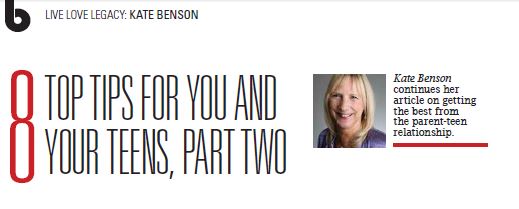Kate Benson continues her article on getting the best from the parent-teen relationship.
In my last article I gave 4 tips each for both teens and parents to improve their relationship. These tips were:
- relax
- remember who’s who
- keep up, slow down
- stay connected and keep the freedom.
It’s just a matter of making some adjustments to navigate through an exciting and formative change in your relationship. The most useful skill you can gain is to smile take yourselves lightly and enjoy the ride.” In this article I’d like to add to those tips,with more insights and ideas for you to consider and try out. Who knows, you might start noticing a big difference in the way things work at home!
Parent Tip 5
Mind your language
Most of the problems parents have with their teens are to do with how they say things not what they say. Parents often talk to their teenagers using words that are guaranteed to upset them. Parents try to get their teens to do what they want with phrases such as: you have to…. you must… you need to… you can’t…. More often than not these phrases spark an argument or a ‘bedroom stomp’.
Practise saying ‘George – tidy your room before you go out please… thank you.’
‘Mary put your dishes in the dishwasher please… thank you.
Notice what a difference simple, straightforward and polite instructions can make to your communications.
Teen Tip 5
Mind your language
Certain phrases you are likely to use will have a very negative and upsetting effect on your parents. Save your colourful language, street terms and swearing for when you are with your friends.
Behave with your parents like you do when you visit your friend’s houses and are wonderfully polite to their parents. obviously this will be very difficult and you will not always manage it but do try. It will make a big difference to how they are with you and you may find that you are allowed much more responsibility because they think you are sensible – so more points scored!
Parent Tip 6
Make a date with your Teen
Forget the trips to the zoo or family gatherings, and think about things that you and your teen have in common that you could share in this new phase of life. do you share the same taste in music? Well probably not but maybe you share the same taste in comedy or fi lms. Find something that you can share together and include one of their friends and make a night out together. In this way you can begin to build the beginnings of an adult relationship with your teen.
Teen Tip 6
Make a date with your parents
Every now and again have a night out with your parents. It’s great because they will pay and you will get an enjoyable night out. look through the ‘what’s on’ pages of your local paper and fi nd something that you will all enjoy. Invite a friend and go on a Tuesday when there isn’t anything exciting happening.
You never know you may have a great time and if not you can always chat on Facebook if you get bored plus you get more points to trade later.
Teen Tip 7
What are they looking at?
When your parents are not smiling at you it doesn’t necessarily mean that they are mad at you! you may think that the only response they have to you is to be cross, but sometimes they appear cross because they are worried about you or want to talk seriously to you.
You may not want to hear what they have to say but it is important to do your best to listen carefully to what they say and then have your say. If necessary take a time out and go away and think about what you want to say in response to them rather than resort to ‘you are so unfair’!
Parent Tip 7
What are you looking at?
Most parents are aware of the hormonal changes taking place in their teenage children but you may not be aware of changes that are taking place in their brains. Some of the ‘brain pruning’ that is taking place means that it is very difficult for teens to recognise and understand the subtle facial expressions you use.
I will talk about this on my NLP for parents days, but for now it’s important to be explicit about what you may assume is implicit. For example your ‘concerned face’ may be read by your teen as your ‘angry face’. When you are worried about your teen, say ‘I am looking at you like this because I am concerned about you’. This way it helps your teen to re-learn to read facial expressions.
Parent Tip 8
Respect their space.
If at all possible keep out of your teen’s bedroom. as they grow up it’s important that the teens feel they have somewhere that is their own territory. your visit to their bedroom to collect dirty dishes and laundry will be taken as a major infringement of civil liberties.
Negotiate under what circumstance and when you will enter their room without their permission and at all other times knock or ask before entering. If necessary put a sign up saying ‘abandon all hope ye who enter here’ and leave the cleaning until they leave home unless it becomes a major health hazard.
Teen Tip 8
Take care of your own space.
You will increasingly feel the need for privacy and your own space, where you control the music and activity. your parents may take some time to adjust to this as they are used to your room being part of their house. The best way to make sure it is your space is to look after it.
This doesn’t mean you have to spend hours cleaning but it really helps if you take your own dishes to the kitchen and put your laundry in the basket. This way your parents have no excuse to invade your privacy.
Kate’s General Advice:
“Like the rest of life, you’re going through something with those around you that’s new, unexplored and potentially really exciting. It will have its ups and downs, but remember that flexibility and engaging with what’s going on around you can really make a massive difference. The reality is, the power is in your hands to make this fun, rewarding and exciting through the choices you make. But my number one word of advice is a simple one: Smile. When you do that you start to take yourself lightly and enjoy the ride.”
– Kate Benson
Director of Education for the Society of NLP.





